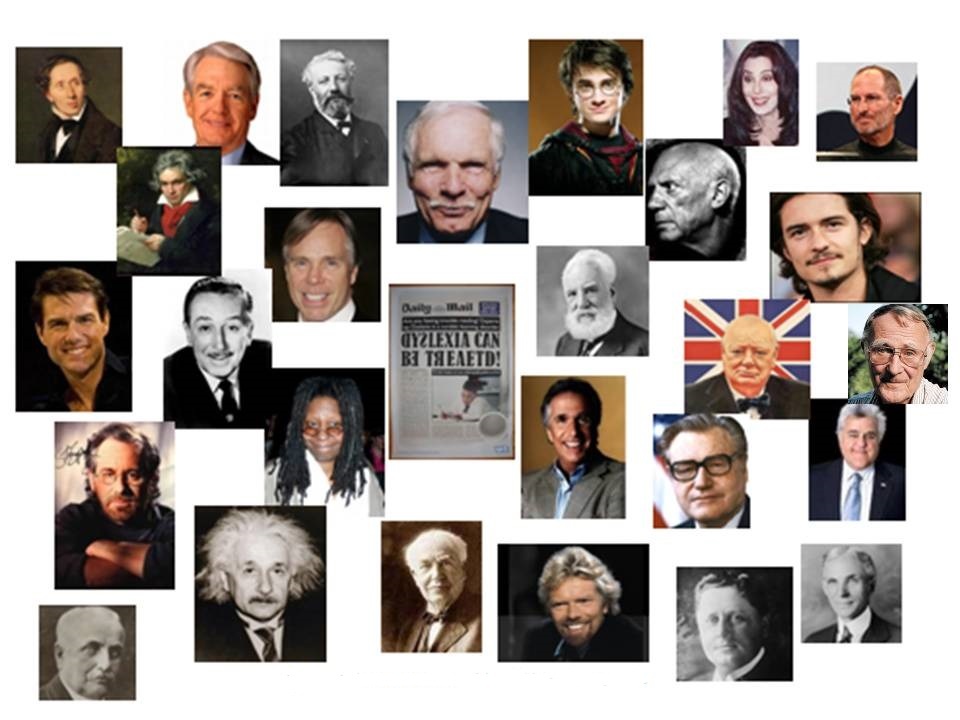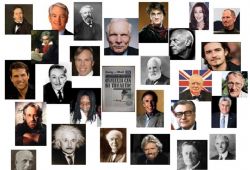Dyslexia is a term that many people
recognize as a type of a reading disability.
However, too often educators, parents and even some students and
professionals understand dyslexia to be the result of difficulties with letter
or word reversals, such as, confusing the letter b with d, or the letter p with
q.
When explained that letter or word
reversals are not typical
hallmark characteristics of dyslexia, they are often shocked and further
confused. So what is dyslexia?
Dyslexia is a specific reading disorder
that is characterized by inaccurate word recognition, decoding and spelling. It
is generally caused by neurological and hereditary factors, and is not due to
poor reading instruction, low intelligence or sheer laziness. More precisely, it is a language processing
deficit. It is not a visual processing
deficit. Dyslexia can also affect one’s
ability to spell, read and write and can impact on reading comprehension.
Often, there are other family members who have dyslexia.
Earlier explanations and understanding of
dyslexia has given rise to the confusion that persists today. Originally, in the 1920s, professionals
understood dyslexia to be the result of deficits in the visual system, thus
causing reversals of letters or words.
However, more recent research has confirmed that dyslexia is mainly a
deficit in the processing of phonemes, the smallest meaningful sound elements
of language and not due to weaknesses in the visual processing of
information. Thus, children with dyslexia
will typically have difficulties in naming letters and not with the copying of
letters.
Dyslexia affects people in many ways and in
different ways. Not all people who are
dyslexic are unable to read. Those who
are quite severe may have extensive difficulty in sounding out the words and
will struggle with reading the words, while others may read well enough but
will need more time to read and to ensure their understanding.
Some of the early signs of dyslexia include
difficulty recognizing letters, difficulty learning letter sound connections,
difficulty pronouncing words clearly, difficulty with word blending or
difficulty with rhyming activities.
Unfortunately, these difficulties may persist despite receiving
intensive instruction and remediation.
Poor self esteem and self confidence are
often by-products of having learning disabilities, including dyslexia. Without having the necessary support, most
individuals who suffer with dyslexia are often quite frustrated with learning
and with school in general. Although these individuals may have strengths in
many other areas, they are often described as reluctant readers. Since the reading process requires an
extensive amount of effort, the motivation and desire to read is typically
diminished or nonexistent.
Fortunately with today’s technology
advancing at such a rapid pace, there are a number of assistive technology
tools that are available and will further help to support individuals who
struggle with reading. These technologies include digitalized readers (e.g.
Kobo, Kindle) audible books, and a number of apps and software. Some apps that could assist in developing and
improving phonological skills include the following; ABC phonics, First Words
Deluxe, Word Magic, Reading Magic, Starfall ABC, Earobics; Sound Literacy and
Read, Write and Type (Talking Fingers).
K12 Timed Reading Practice is an app that addresses reading fluency and
comprehension for students from kindergarten to grade 4. Toy Story read along (app), The Three Pandas
(app), Clicker Books (app), tumble books (online, app), Read Me Stories 30 Book
Library (app), Audio books (app) and Audible.com (online) are suggested audible
book resources available either for free or at a nominal fee.
If dyslexia is suspected, it is important
to consult a trained professional who can evaluate and determine if in fact
dyslexia is present. Having dyslexia
does not mean continued school failure and low level job opportunities. Just look at the number of successful people
who are known to have dyslexia. Some of these famous people include John F.
Kennedy (president of the United States of America), Steven Spielberg (film
director and screen producer) Cher
(singer), Jay Leno (comedian, talk show host), Thomas Edison (American inventor
and businessman), Ted Turner (American
media mogul who founded CNN), Albert Einstein (physicist), and Alexander Graham
Bell (scientist, inventor and engineer) to name a few. The key to success is
early identification, early intervention and much needed accommodations.

 In The Latest Issue:Latest Issue:
In The Latest Issue:Latest Issue:
- A Bittersweet Farewell
- The new Laval Aquatic Co...
- The End of an Era:
Articles
Calendar
Virtual- ANNUAL TEACHER APPRECIATION CONTEST
- APPUI LAVAL
- ARTS & CULTURE
- CAMPS
- CAR GUIDE
- CCIL
- CENTENNIAL ACADEMY
- CHARITY FUNDRAISING
- CITYTV
- COSMODÔME
- COMMUNITY CONNECTIONS
- COVER STORY
- DINA DIMITRATOS
- ÉCOLE SUPÉRIEURE DE BALLET DU QUÉBEC
- EDITORIALS
- ÉDUCALOI
- EDUCATION
- EMPLOYMENT & ENTREPRENEURSHIP
- FÊTE DE LA FAMILLE
- FÊTE DU QUARTIER SAINT-BRUNO
- FAMILIES
- FESTIVAL LAVAL LAUGHS
- FÊTE DE QUARTIER VAL-DES-BRISES
- FINANCES
- GLI CUMBARE
- GROUPE RENO-EXPERT
- HEALTH & WELL-BEING
- 30 MINUTE HIT
- ANXIETY
- CHILDREN`S HEALTH & WELLNESS
- CLOSE AID
- DENTAL WELLNESS
- EXTREME EVOLUTION SPORTS CENTRE
- FONDATION CITÉ DE LA SANTÉ
- GENERAL
- HEARING HEALTH
- MESSAGES FROM THE HEALTH AGENCY OF CANADA
- MENTAL HEALTH
- SEXUALITY
- SOCIAL INTEGRATION
- SPECIAL NEEDS
- TEENS
- THE NUTRITION CORNER
- THE NUTRITION CORNER - RECIPES
- VACATION DESTINATION
- WOMEN'S FITNESS
- WOMEN'S HEALTH
- HILTON MONTREAL/LAVAL
- HOME & GARDEN
- INTERNATIONAL WOMEN'S DAY
- JAGUAR LAVAL
- LAVAL À VÉLO
- LAVAL FAMILIES TV SHOW
- LAVAL FAMILIES MAGAZINE CARES
- LAVAL URBAN IN NATURE
- LE PARCOURS DES HÉROS
- LES PETITS GOURMETS DANS MA COUR
- LEON'S FURNITURE
- LEONARDO DA VINCI CENTRE
- LFM PREMIERES
- LIFE BALANCE
- M.P. PROFILE
- MISS EDGAR'S AND MISS CRAMP'S SCHOOL
- MISSING CHILDREN'S NETWORK
- NETFOLIE
- NORTH STAR ACADEMY LAVAL
- OUTFRONT MEDIA
- PASSION SOCCER
- PARC DE LA RIVIÈRE-DES-MILLE-ÎLES
- PÂTISSERIE ST-MARTIN
- PIZZERIA LÌOLÀ
- PLACE BELL
- PORTRAITS OF YOUR MNA'S
- ROCKET DE LAVAL
- SACRED HEART SCHOOL
- SCOTIA BANK
- SHERATON LAVAL HOTEL
- SOCIÉTÉ ALZHEIMER LAVAL
- STATION 55
- STL
- SUBARU DE LAVAL
- TECHNOLOGY
- TEDXLAVAL
- TODAY`S LAURENTIANS AND LANAUDIÈRE
- TODAY`S LAVAL
- WARNER MUSIC
- THIS ISSUE
- MOST RECENT
Magazine
Straight talk about DYSLEXIA
Articles ~e 105,7 Rythme FM 4 chemins Annual Teacher Appreciation Contest Appui Laval Arts & Culture Ballet Eddy Toussaint Camps THIS ISSUE MORE...
CONTESTS Enter our contests
CONTESTS Enter our contests
CALENDAR
Events & Activities
COMMUNITY Posts Events
PUBLICATIONS Our Magazine Family Resource Directory
LFM BUSINESS NETWORK Learn more
COUPONS Click to save!
COMMUNITY Posts Events
PUBLICATIONS Our Magazine Family Resource Directory
LFM BUSINESS NETWORK Learn more
COUPONS Click to save!
SUBSCRIPTIONS
Subscribe to the magazine
Un-Subscribe
E-NEWSLETTER Subscribe to our E-newsletter Un-Subscribe
WRITE FOR US Guidelines & Submissions
POLLS Vote today!
E-NEWSLETTER Subscribe to our E-newsletter Un-Subscribe
WRITE FOR US Guidelines & Submissions
POLLS Vote today!
ADVERTISERS
How to & Media guide
Pay your LFM invoice
SUGGESTIONS Reader's Survey Suggest a Listing
LFM About Us Our Mission Giving Back Contact Us
SUGGESTIONS Reader's Survey Suggest a Listing
LFM About Us Our Mission Giving Back Contact Us
 PICK-UP LOCATIONS
Get a copy of LFM!
PICK-UP LOCATIONS
Get a copy of LFM!
TERMS & CONDITIONS Privacy | Terms
ISSN (ONLINE) 2291-1677
ISSN (PRINT) 2291-1677
Website by ZENxDESIGN




 BY:
BY: 
Tweet
Share